Kitchen buffet: types and selection rules
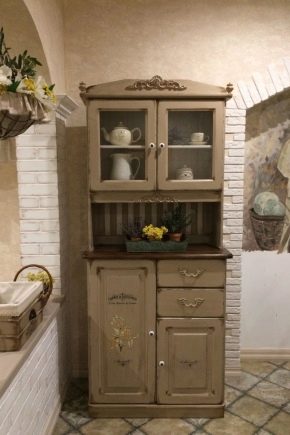
In planning a kitchen, the creation of an individual functional space is of particular importance. It is important that it not only relieves work surfaces, but also features the convenience of storage systems. One of the furnishing elements that meets these criteria is the buffet. The material of this article will acquaint the reader with the features of such furniture and the main nuances of its choice.
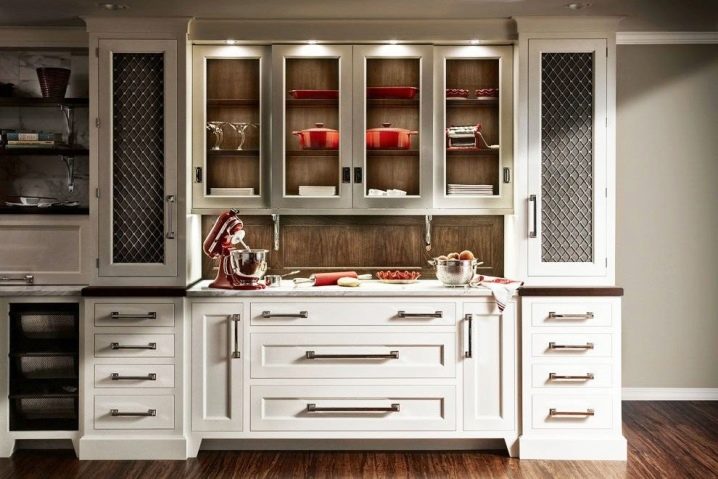
Appointment
A kitchen cabinet is nothing more than furniture for storing various items. It can store:
- sets and crystal;
- dishes;
- cereals and spices;
- kitchen towels;
- dishwashing detergents;
- small household appliances (for example, a coffee grinder).
This furniture can become part of a kitchen set. It can be installed in the kitchen-living room, where, in addition to its main function, it can also have a decorative load. It is beautiful, fashionable, stylish. In addition, the sideboard indicates that the design belongs to a particular interior style. This is a significant detail when drawing up a particular style.
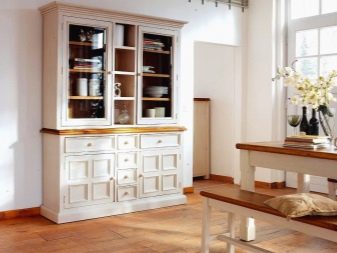
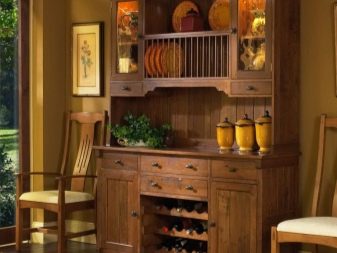
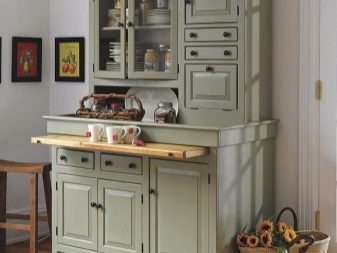
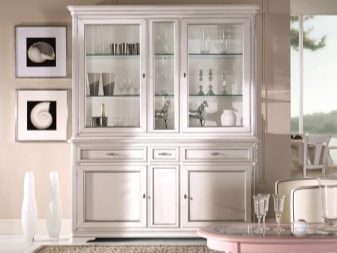
Varieties and their features
Today, the market for furniture products is packed with offers, among which there are kitchen cupboards of a wide variety of configurations. Consider the classification of products according to several criteria.
Manufacturing materials
By the type of material, they can be made from different raw materials, which affects the durability of the models. The most common options are wood products, MDF, chipboard. Less often on sale, you can find options made of metal and durable plastic. Stainless steel can be used as metal; depending on the design, metal surfaces can be painted.
The best products are wood models treated with special moisture-resistant and fire-resistant impregnations. They look solid and expensive, thus raising the status of the kitchen interior. Products from wood derivatives are designed for 5-7 years. During operation at high humidity in the kitchen, they can delaminate.
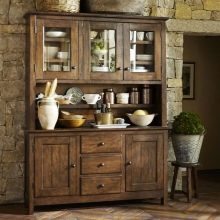
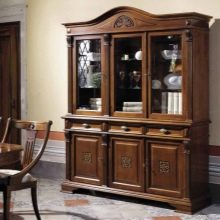
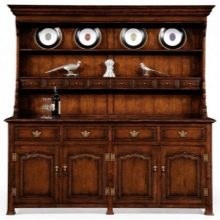
Metal and plastic are often used as inserts. The same applies to glass: thanks to it, the sideboards look aesthetically attractive. Such furniture fills the room with spaciousness, which is especially important in a kitchen. Glass can be used for shelves and facades, and the texture of the material can be different (glossy, frosted, tinted, flat or with a relief pattern).
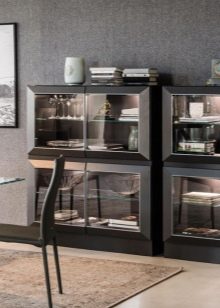
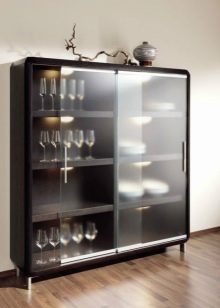
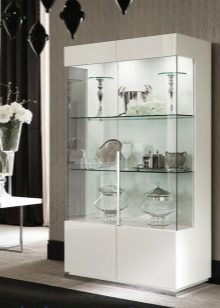
Design
Structurally, the models can be classified into two categories: linear and angular. In this case, linear products, as a rule, have a large width, while analogs of the angular type can be very narrow. Depending on the design and storage volume, these models have from one to three faces, the shape of some of them tends to be rounded. Other models show linearity: they resemble a hexagon cut in two.
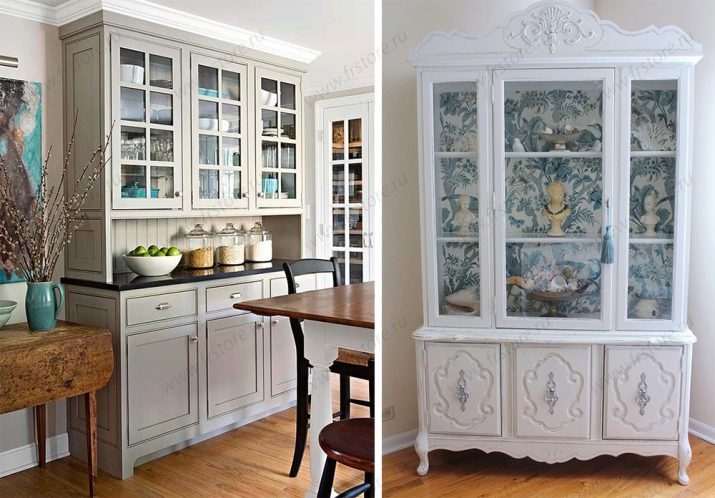
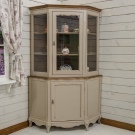
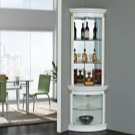
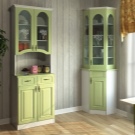
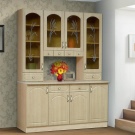
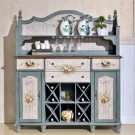
Products can be monolithic sideboards or resemble wall and floor cabinets connected by side walls. Other varieties have blind doors, through which it is not visible what is stored inside. This is good from the point of view of order: the less dishes are visible, the more spacious and tidy the room seems. Other modifications are performed as display cabinets, the purpose of which is to showcase the internal content.Such products are more often installed in kitchens combined with a living room, decorating the dining space of the dining room.
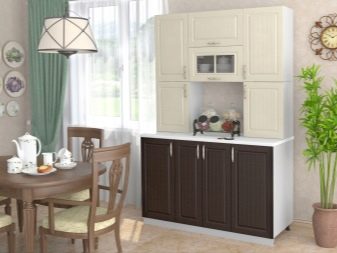
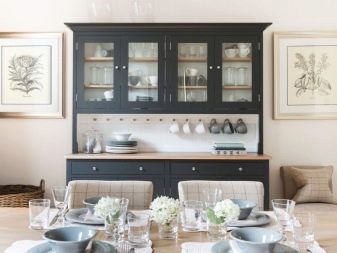
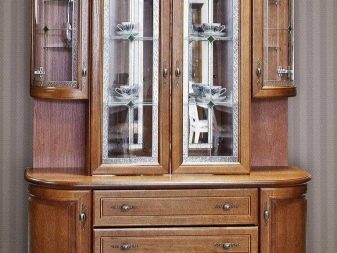
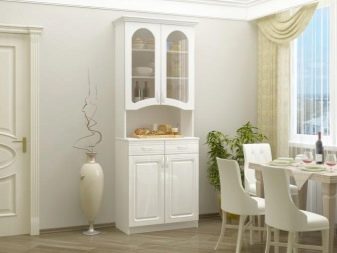
Depending on the design, the structures may or may not have legs. Supports can be carved, ornate and even pretentious. If the style is demanding for minimalism, the legs are simple. Often they are tall, which is convenient for cleaning. The number of supports depends on the width of the sideboard: there can be 4 or even 6. At the same time, the corner modifications can have 4 in the front, and 2. The linear counterparts have strictly symmetrical legs.
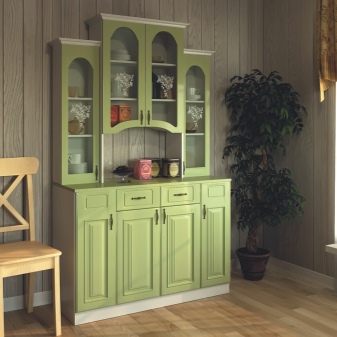
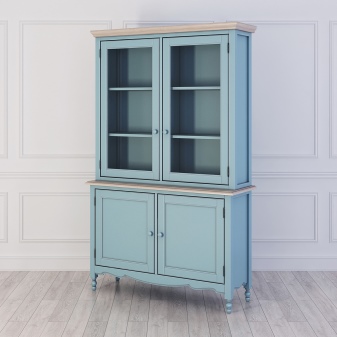
Structurally, it is possible to classify products by the number of modules. For example, a sideboard can be of one structure, or it can consist of two or even three parts. In this case, the product can be traditional classic or built into the wall. In the second case, the buyer often tries to use the niches available in the kitchen. The structure can consist of an upper hanging unit and a lower unit, similar to a kitchen chest of drawers, equipped with three or more rows of drawers.

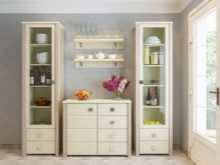
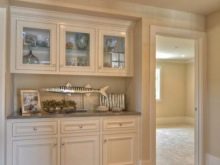
By form
Kitchen cupboards can differ in width, length, straight lines. For example, they can be narrow, which is especially important for kitchens in small apartments. Such products will not take up much space, while not prejudice to their functionality. Their width can be 40-45 cm. At the same time, the widths of the upper and lower elements may differ for modifications. For example, the top drawers can be very narrow (30 cm).
The depth of more spacious counterparts can be about 50 cm. In this case, the depth of the upper cabinets can be the same or less by 10 cm. The tabletop can protrude beyond the cabinets, thereby increasing the size. Other varieties differ in depth up to 60 cm. The shape of the models can be linear, streamlined, rounded, and sometimes wavy. Some products have a ladder-like top edge, others have an arch-shaped drawer.
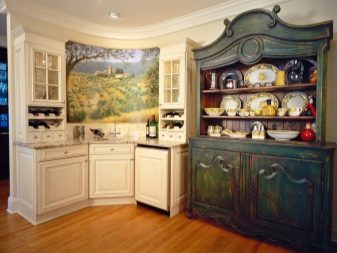
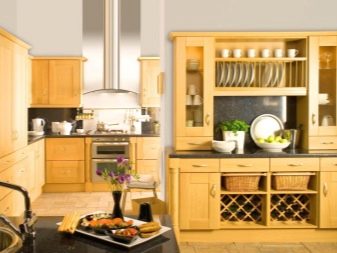
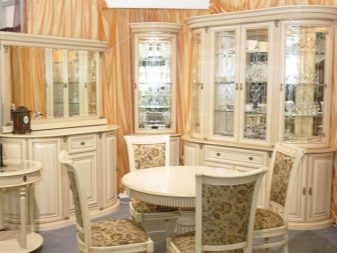
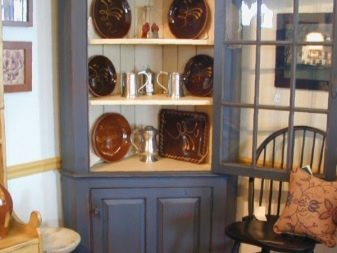
By storage type
Conventionally, all varieties can be divided into 3 groups: open, closed and combined type. Each variety has its own differences, which are reflected in the storage systems and practicality of the product itself. Models may differ in design, but their main differences, by which they are classified, are always the same. Let's consider the features of each category.
Open type
A representative of any design of this model is distinguished by the fact that it has no doors. These modifications are more like shelving. They have a single frame that unites all the shelves as well as the back wall.
It is impossible to call such varieties convenient for kitchen conditions: dust quickly settles on them, and therefore the hostess is forced to brush it off not only from the shelves, but also from the items that are stored on them.
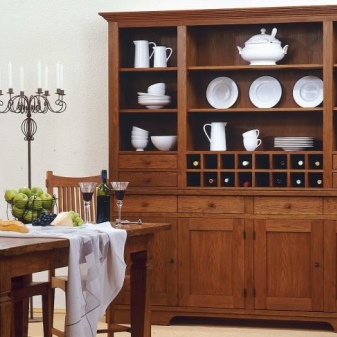
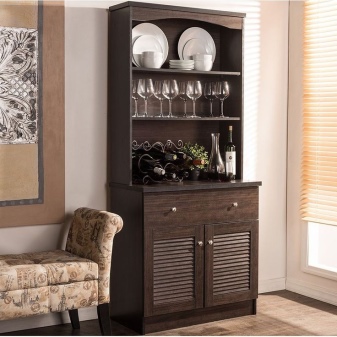
Closed type
Such kitchen chests of drawers differ from their counterparts in that the storage systems are closed here. It can be both different types of doors and drawers, systems with sliding and swing type opening. These models are convenient: in addition to the fact that they can hide a lot of little things inside, dust will not settle on stored items, moisture will not get on them. Of course, if the facades are glass, the storage items will be visible, but their practicality will be an indisputable point.
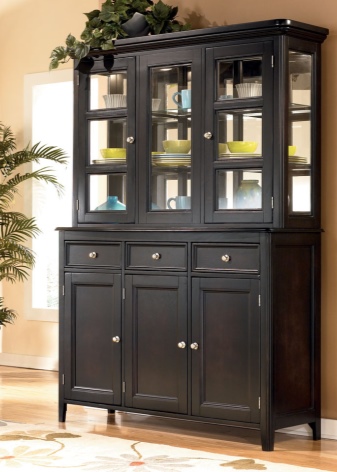
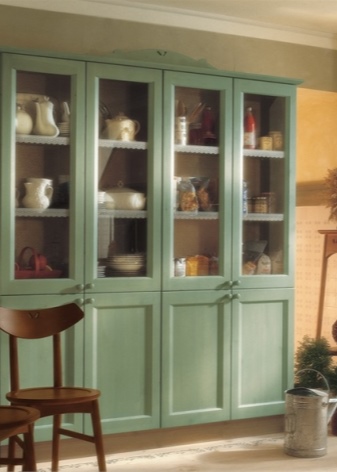
Combined
Such modifications are quite convenient and allow you to turn the kitchen sideboard into a full-fledged element of a modular set. For example, modifications can have a worktop that the hostess can use to prepare food. In fact, the unifying element of such products is three walls (back and two side). In addition, storage systems can be combined. For example, some of the shelves may be open, while the model may have drawers.
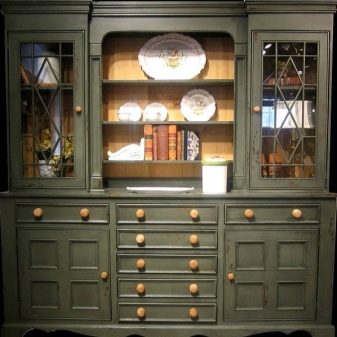
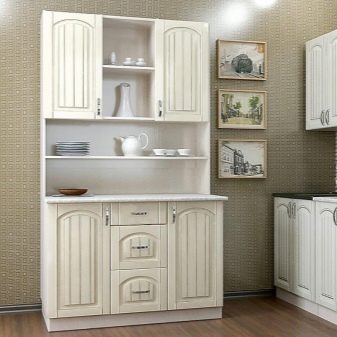
Classical
The classic sideboard is of a combined type.A distinctive feature of such a product is its height: it resembles a wardrobe. It has a symmetrical arrangement of doors, there can be two or three of them. The sideboard itself can provide both separate doors for opening the upper and lower cabinets, and single doors that open everything at once. The configuration of the models can vary, but they always have 4 reliable supports, a glazed top and a blank bottom.
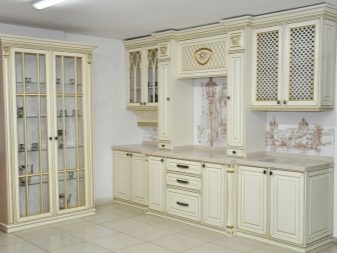
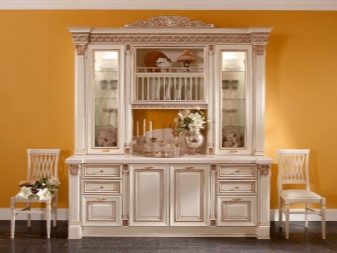
Style selection
The modern look at the arrangement of the kitchen has many features. For example, today it is important that all furniture, as well as room accessories, are designed in the same interior style. It is not only beautiful, but also creates a special inner atmosphere, immersing household members and family guests in it. The sideboard for each design direction will differ in shape, fittings, decoration, and also color. Here you will have to proceed from the resource of a specific style, taken as a basis for drawing up an interior composition. Consider a few of the current styles that are favorites today in the arrangement of kitchens.
Classical
In fact, in the classic style, several old or even old styles that are relevant out of time are intertwined. The classic style kitchen buffet is distinguished by light colors and the obligatory presence of stucco or gilding. Handles, ornaments on the facades can be gold. The design of the furniture can be arched, the royal scale should be felt, the priority is white and pastel shades of the color palette.
A sideboard for dishes must be necessarily wooden, made of valuable solid wood, exclusive, possibly antique.
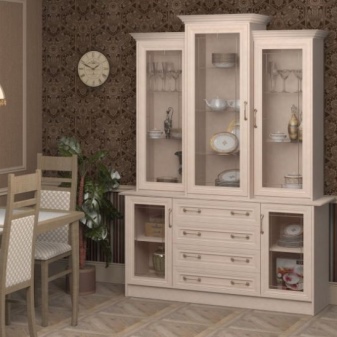
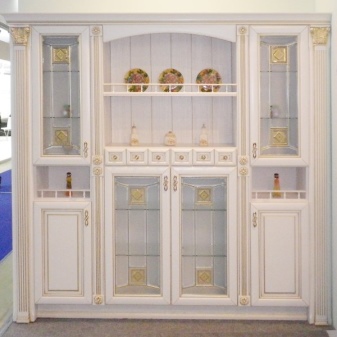
Retro
Such furniture implies the presence of bright and rich colors. The sideboard should feel old but modern. The purchase of new furniture should reflect the vision of the times that are planned to be recreated (50s, 60s or 70s). The wardrobe can be plain and bright with a strictly traceable geometry. If the preference is given to the era of the 60s, it is possible to purchase a product with a floral print on the facades. A 70s-inspired version would be intricate, perhaps in lacquered wood. In addition, furniture can be artificially aged.
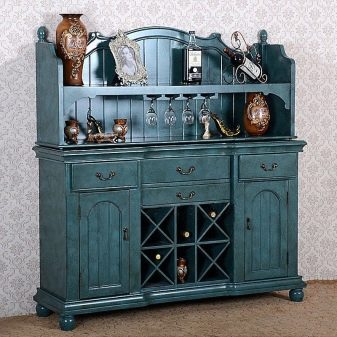
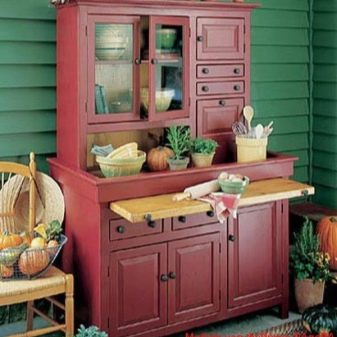
Provence
The fashion of the French hinterland today is at the peak of design popularity. Such furniture should seem old, with a touch of family history. These are necessarily carved legs, the presence of monograms as the decoration of the sideboard, perhaps the purchase of a product with forged openwork inserts. The design can be open, painted in light colors of the color palette. The priority is ivory, white and snowy shades.
The material of the sideboard should be wood, while it is desirable that it be artificially aged.
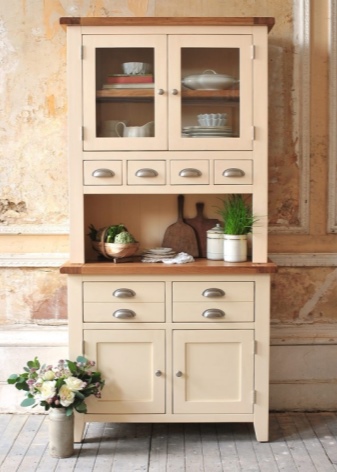
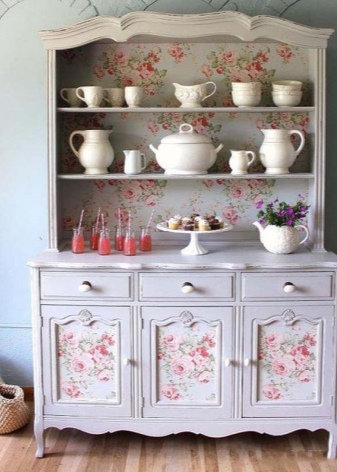
Country
The design of this style does not accept flashy colors and their sharp contrast. The country-style sideboard should not have plexiglass or plastic inserts. Since the dishes need to be highlighted, the color of the product must be different from it. For example, the priority is the natural color palette. Furniture should indicate the ethnic features of the area, the interior of which you want to recreate.
It is important that specific national characteristics are traced in its design. The texture of the sideboard should be matte, the color resource is wood, light beige, greenish, blue and pale terracotta tones.
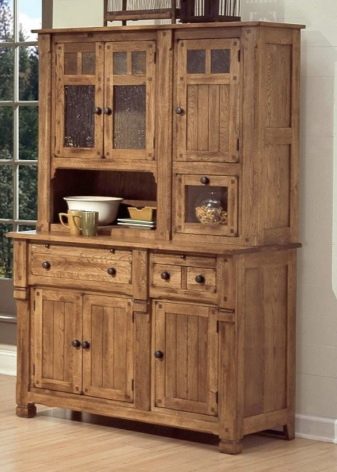
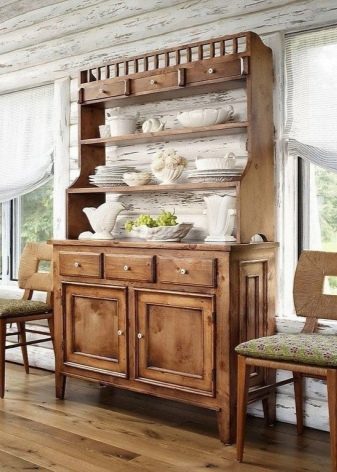
Modern
The requisites of this style are the abundance of expensive wood, the plasticity of the forms, the curvature of the lines. In order for the sideboard to look harmonious in such a kitchen, it must be compact, wooden, with a smooth and somewhat unusual shape. Furniture inlay is welcome, as well as carving. The shade of the buffet should be light (for example, ash pink, blue, bleached lavender, peach). However, tones of dark wood are also welcome.
The model must have a streamlined shape: sharp corners and edges are unacceptable.
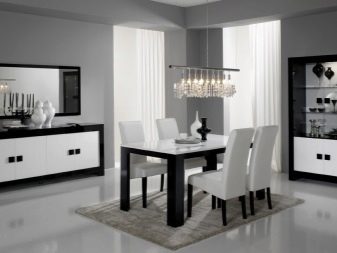
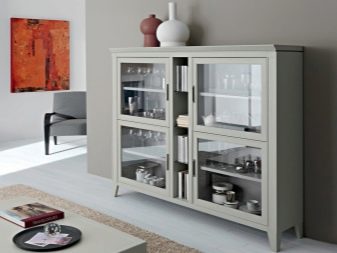
High tech
Unlike other design directions, it is extremely important to highlight the artificial component of the furniture. A high-tech sideboard should be made of artificial material. Here, like nowhere else, the presence of glass facades is important, it is possible to use stainless steel elements. There should be as little decor as possible. The wardrobe can be almost completely made of glass, while its storage system should be so convenient as to reduce the number of movements of the hostess when searching for the necessary thing.
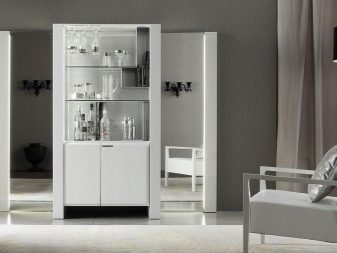
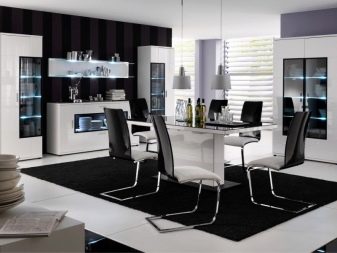
How to arrange?
The installation of a cupboard for storing dishes will depend on the specifics of the kitchen itself. For example, if it is combined with the living room, placing furniture in the dining area would be an excellent solution. For example, you can place the wardrobe near the dining table, opposite the entrance to the kitchen. When the product consists of linear and angular modules, one of them is installed in a corner, the second can stand at a certain distance, being located at one of the adjacent walls.
At the same time, you can put a table, a chest of drawers, as well as a compact sofa or an armchair between the modules. In a small kitchen, the product is installed so that it does not upset the balance of the working triangle with the tops of the refrigerator, stove and sink.
If there is a place opposite the linear arrangement of the headset, you can use it specifically for installing the buffet. In any case, furniture should not interfere with movement in the kitchen; it can be built into the wall opposite the dining area or to the side of it.
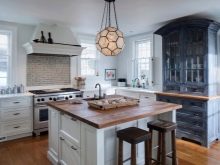
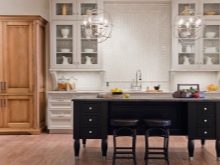
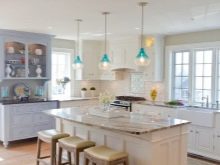
How to choose?
Choosing this or that product for arranging a kitchen or kitchen-living room, there are several key purchase criteria to consider.
- The size of the sideboard should not stand out against the background of the dimensions of the existing furniture.
- The color of the furniture can be related to the shade of the headset, dining table, chairs. The shade of the crockery sideboard must not be allowed to blend in with the tone of the floor cladding.
- You need to buy a product that is practical from the point of view of operation and cleaning, giving preference to the closed version.
- If the walls in the house are not porous, you can take a closer look at the product with hanging display cabinets.
- The shape of the product should be in harmony with the shape of the existing furniture.
- It is important to pay attention to the fittings of all furniture and even ceiling lighting, this will create the effect of the unity of the kitchen furniture composition. The temperature of the shade also matters: it should be the same throughout the room.
- The wardrobe should not look lonely: it may be worth taking a closer look at the available accessories (for example, flowerpots), paying attention to the similarity of lines, contours, finishes.
- The product must be comfortable and functional, you need to watch that the opening and closing mechanism works properly and without jamming.
The dimensions of the shelves and the number of compartments are selected based on what exactly is planned to be stored inside.
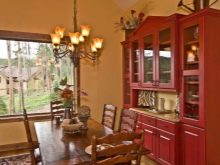
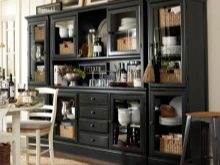
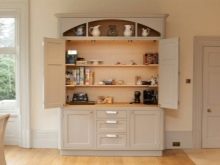
Beautiful examples in the interior
We suggest referring to several examples of photo galleries, clearly demonstrating the possibilities of functional change of space through kitchen cupboards.
- The color matching of the sideboard and the upholstery of the chairs in the dining area creates the effect of a furniture ensemble.
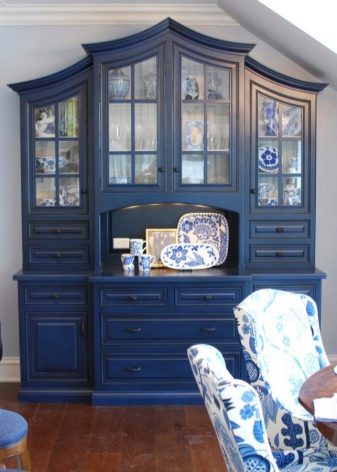
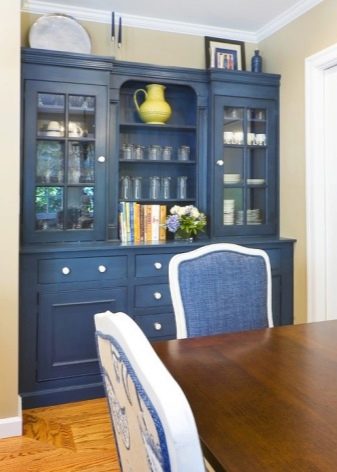
- Backlit model, consisting of floor-standing and wall-mounted modules.
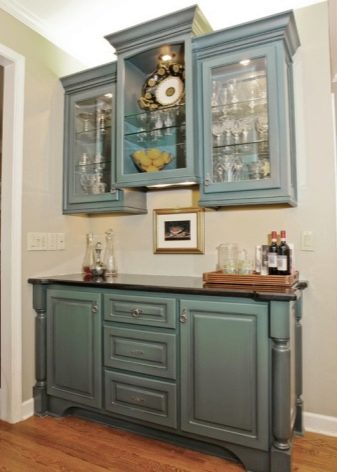
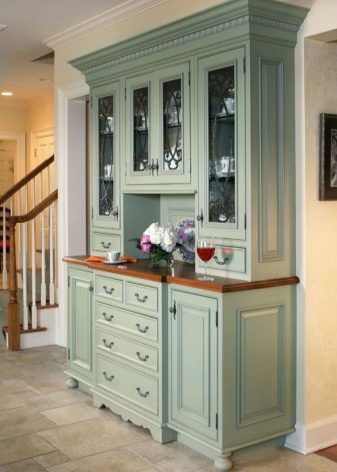
- A compact version of the sideboard with a worktop, built into a niche.
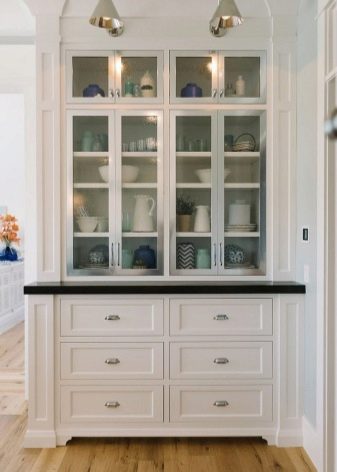
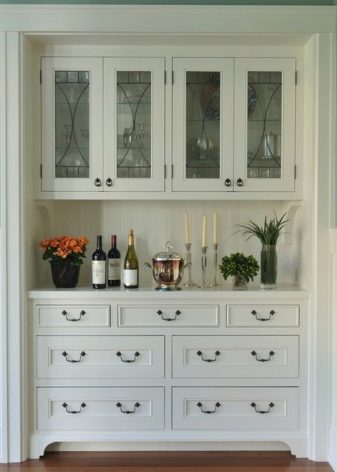
- A variant in wood, matched to the furniture in the dining area.
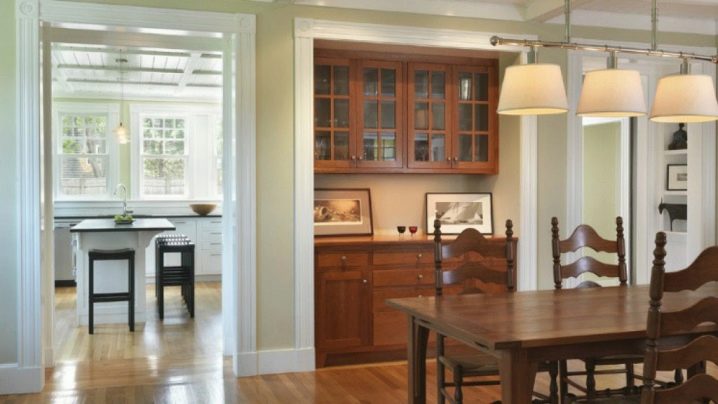
- White model that brings light and air to the interior.
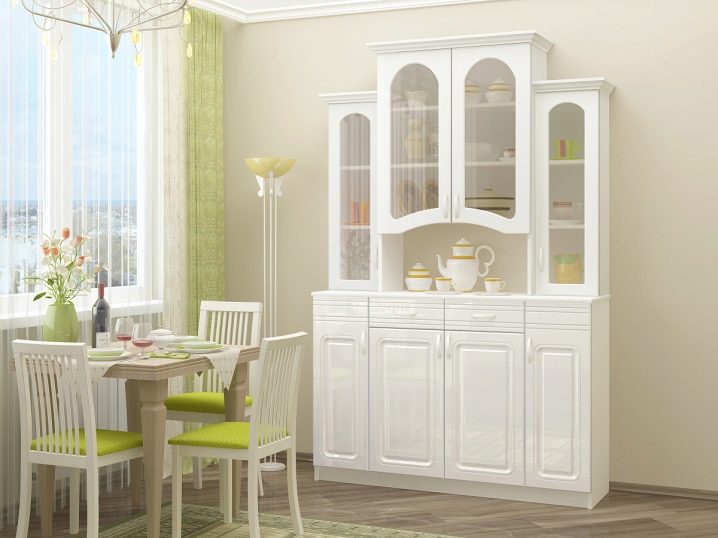
- A beautiful display cabinet for dishes that can become a decoration of the kitchen.
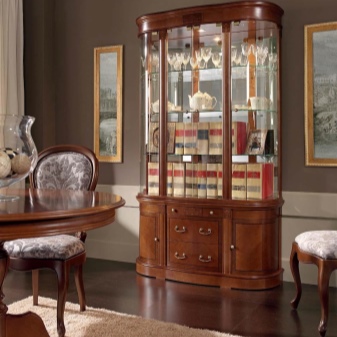
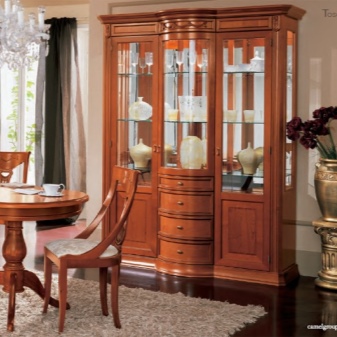
- An original solution for arranging a kitchen space.
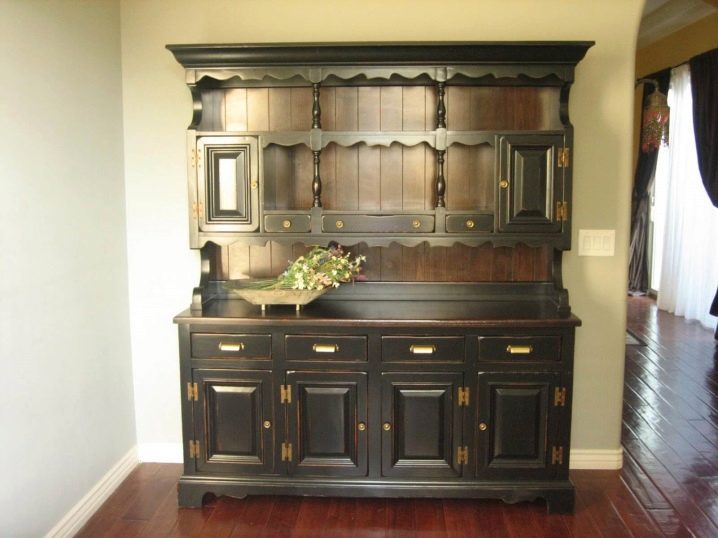
For information on how to make a sideboard for the kitchen or living room, see the next video.













The comment was sent successfully.